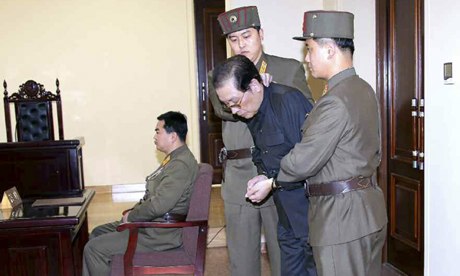
Yonhap/Reuters
On Friday, North Korea announced the execution of Jang Song Thaek, formerly the second most powerful person in the country and the head of National Security Protection Bureau, the North Korean secret police organization that "runs North Korean prison camps and arrests people for political crimes." Oh, and he's Kim Jong Un's uncle.
Lots of ink have been spilled analyzing this unfolding development, though the best analyses so far that I've found are from One Free Korea, which you can find here and here, and the Weekly Standard.
Of course, the question now is: what are the implications for North Korea, its neighbors and the United States? Below is my take.
- I really doubt that Jang Song Thaek really wanted to stage a coup. I might be wrong here, but that's just not in the psychology of a regime survivor like Jang. The majority of coup-plotters are people outside the inner circle of the regime. Why bring down a regime from which he benefitted? Granted that North Korea is different, but had Jang really wanted to bring down the regime and become the new dictator, he should have done it right after Kim Jong Un's ascension, when Kim was still seen as new and untested and Jang's position was strong -- or when Kim made a really bad mistake, giving Jang a pretext to strike.
- Rather, I think, based on all the supposed crimes that Jang did, this is a very strong signal to the Chinese. While one could say that this is somewhat akin to "cutting off one's nose to spite the face," it looks to me that Kim Jong Un really despises what he saw as Chinese interventions on North Korean politics, or maybe that he just didn't welcome the Chinese embargo in light of North Korean nuclear test.
- Moreover, Jang and China are basically nice scapegoats for all the shortages in North Korea. By denouncing Jang for selling resources cheaply, Kim basically blamed Jang for North Korea's economic mess.
- Does this show weaknesses in Kim's regime? Yes and no. Yes, in that it is a very strong signal to North Korean elites that nobody is safe anymore, thereby notching up the fear factor significantly. Should the elite really able to settle on one person to succeed Kim, then Kim's regime is numbered. But then again, Stalin literally almost eradicated the entire Soviet elite and he died naturally on his bed, still holding his power. Thus it depends on Kim's ability to play political elites against each other. In this case, though, I really doubt that Kim Jong Un is as adept in politics as either Stalin or even his father, Kim Jong Il. In fact, the execution of Jang could be the fatal mistake that Kim made, the straw that break the camel back. I'd expect some regime disturbances in near future.
- Does this mean that the regime might launch provocations to rally everyone around the flag? I expect to see a nuclear or missile test next year, but I really doubt that Kim would send his troops to provoke or even invade South Korea. You never to go war bringing people you don't trust.
- What about China? China will seethe, but as long as it doesn't find any political elite to co-op, it can't do anything short of widening the embargo. In any case, after the Jang episode, it's probably impossible for China to find anyone in North Korea willing to cooperate. This, then, shows the limitations of China's supposed "levers" on North Korea.
- What about the North Korean economy? It will remain dysfunctional. Even though Jang's execution means that the regime is getting rid its best financier, as Jang was involved in practically every aspect of North Korean trade with outside world, Kim can still survive and find enough people to do business with, though these deals will be probably be worse than the ones Jang could produce.
- What should the United States do? Nothing. It can't do anything anyway. This is a purely internal matter, though the United States should expect some signals from Kim, such as asking for food in exchange for stopping its nuclear development. Meaning, business as usual.
What do you think?

No comments:
Post a Comment